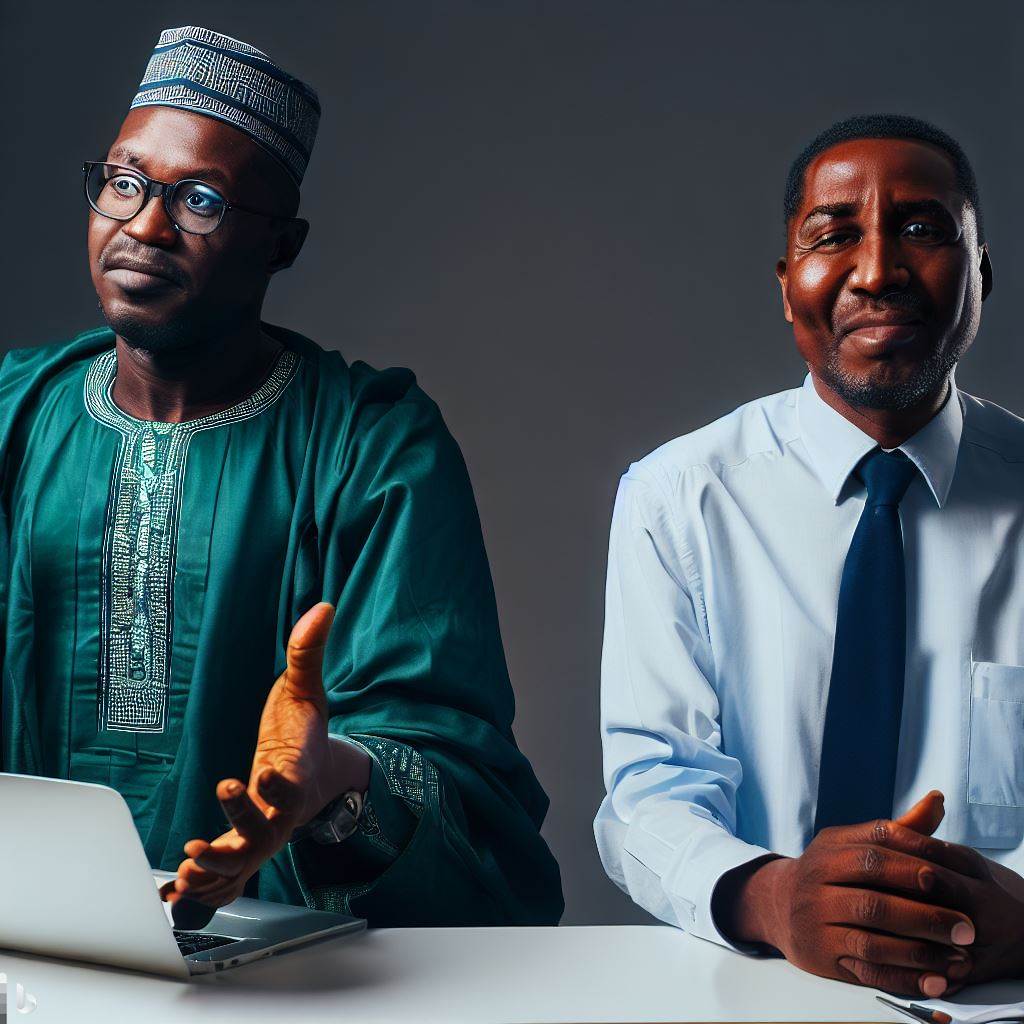Introduction
Nigeria’s democracy has been a crucial aspect of its political landscape since its independence in 1960. Political scientists play a vital role in ensuring the success and stability of democratic systems like Nigeria’s.
This blog post aims to explore the significance of political scientists in Nigeria’s democracy and highlight their contributions to the country’s political development.
By examining their roles, we can better understand the importance of their work in the Nigerian context. Let’s delve into this topic in more detail.
The definition and scope of political science
The Role of Political Scientists in Nigeria’s Democracy
A democratic society is built upon the principles of political participation, representation, and the protection of individual rights.
In Nigeria, a country with a young democracy, political scientists play a crucial role in shaping, maintaining, and strengthening the democratic processes.
Political science, as a field of study, encompasses various branches and subfields that contribute to our understanding of democracy.
Definition and Scope of Political Science
Political science is a social science discipline that focuses on the theory, practice, and study of politics and government systems. It analyzes political behavior, institutions, policies, and their impact on societies.
As such, political science aims to comprehend the dynamics of power, decision-making, and governance.
Explanation of Political Science as a Field of Study
Political science explores the intricacies of political systems, both domestic and international.
It investigates the relations between citizens and institutions, as well as the role of public opinion, interest groups, and electoral processes.
By examining political phenomena, political scientists seek to explain and predict political outcomes.
Various Branches and Subfields within Political Science
The field of political science encompasses various branches and subfields, each focusing on different aspects of politics. These include:
- Comparative Politics: The comparative study of different political systems, their structures, and functions.
- International Relations: The study of interactions among nations, including diplomacy, foreign policy, and global issues.
- Political Theory: The examination of political ideas, ideologies, and philosophies.
- Public Administration: The analysis of governmental bureaucracy, public policy implementation, and management.
- Public Opinion and Voting Behavior: The study of citizen preferences, political participation, and electoral processes.
- Political Economy: The investigation of the relationship between politics and the economy, including the distribution of resources.
Relevance of Political Science in Understanding Democratic Processes
Political science plays a vital role in understanding democratic processes, particularly in Nigeria.
It offers valuable insights into the functioning of political institutions, the behavior of political actors, and the factors influencing policy outcomes within a democratic context.
Political scientists study electoral systems, political parties, and public opinion to assess the quality of democracy and identify potential obstacles to its consolidation.
They also analyze the influence of interest groups, media, and civil society organizations on democratic governance.
Therefore, political science research helps identify the causes and consequences of political instability, corruption, and ethnic or religious tensions in a democratic society.
By understanding these dynamics, political scientists can provide policymakers with evidence-based recommendations for improving democratic processes and fostering social cohesion.
In Nigeria, political scientists have a crucial role in fostering inclusive and participatory democracy.
Through their work, they can contribute to the development of effective electoral systems, transparent governance mechanisms, and policies that promote socioeconomic development.
In fact, political scientists can serve as advisors to political leaders, facilitating evidence-based decision-making.
By providing insights into the social, economic, and political realities of Nigeria, they can help policymakers shape effective and equitable policies that address the needs and aspirations of the population.
In summary, political science is a multidimensional field of study that informs our understanding of democratic processes.
In Nigeria, political scientists play a critical role in advancing democracy by analyzing political behavior, institutions, and policies.
Through their research and expertise, they contribute to the consolidation of democratic processes and the promotion of good governance in the country.
Read: How to Get Your First Curator Job in Nigeria
Contributions of political scientists in Nigeria’s democracy
In Nigeria’s democracy, political scientists play a crucial role through their contributions in various aspects:
- Conducting research and analysis on political institutions and processes
- Providing expert advice to policymakers and government officials
- Monitoring elections and ensuring their fairness and transparency
In short, political scientists also contribute in the following ways to Nigeria’s democracy:
- Evaluating the impact of government policies
- Enhancing public awareness and engagement
- Providing training and capacity building
- Advocating for good governance and accountability
- Studying and resolving political conflicts
Generally, political scientists play a vital role in Nigeria’s democracy through their contributions in conducting research, providing expert advice, monitoring elections, evaluating government policies, enhancing public awareness and engagement, providing training and capacity building, advocating for good governance, and studying and resolving political conflicts.
Read: Freelance Curating in Nigeria: Tips and Insights

Influencing public opinion and fostering political awareness
Political scientists play a crucial role in Nigeria’s democracy by influencing public opinion and fostering political awareness.
Through various means, they disseminate research findings, engage in public debates, discuss political issues, and educate citizens about democratic principles and rights.
Dissemination of research findings and knowledge through publications and media
One of the primary roles of political scientists in Nigeria’s democracy is to disseminate their research findings and knowledge through publications and media platforms.
They conduct extensive research on various political topics, including governance, policy-making, and electoral processes.
By publishing their findings in academic journals, books, and articles, they contribute to a better understanding of Nigeria’s political landscape.
Basically, political scientists utilize media platforms such as television, radio, and online channels to share their insights.
They often participate in interviews and panel discussions, where they present their research findings and provide expert analysis on current political events.
By making their knowledge accessible to the public, they contribute to informed debates and discussions.
Engaging in public debates and discussions on political issues
Political scientists actively engage in public debates and discussions on various political issues in Nigeria.
They participate in panel discussions, seminars, and conferences, where they share their perspectives and expertise.
By presenting evidence-based arguments and analysis, they contribute to well-informed debates and decision-making processes.
Most importantly, political scientists often collaborate with other stakeholders, including policymakers, civil society organizations, and advocacy groups.
Through these collaborations, they have a platform to voice their opinions and influence policy decisions. By actively engaging in public debates, they contribute to the formulation of more effective and inclusive policies.
Educating citizens about democratic principles and rights
Another crucial role of political scientists is educating citizens about democratic principles and rights.
They strive to promote political awareness and ensure that citizens are cognizant of their roles and responsibilities in a democratic society.
Political scientists organize workshops, seminars, and public lectures to engage with citizens and educate them about democratic processes.
They provide information on topics such as electoral procedures, voting rights, and the importance of citizen participation.
By empowering citizens with knowledge, political scientists help strengthen democratic institutions and promote active citizenship.
In general, political scientists in Nigeria play a significant role in influencing public opinion and fostering political awareness.
Through the dissemination of research findings and knowledge, engagement in public debates, and education of citizens about democratic principles and rights, they contribute to a more informed and participatory democracy.
Their work is essential in shaping Nigeria’s political landscape and ensuring the active involvement of citizens in decision-making processes.
Read: The Influence of International Curators in Nigeria
Role in policy formulation and implementation
The Role of Political Scientists in Nigeria’s Democracy
Political scientists play a crucial role in shaping and strengthening Nigeria’s democracy. They contribute in various ways, including their involvement in policy formulation and implementation:
Role in Policy Formulation and Implementation
- Assisting in the formulation of effective policies for democratic governance.
- Evaluating the impact and effectiveness of existing policies.
- Collaborating with policymakers to implement necessary reforms.
Assisting in the formulation of effective policies for democratic governance
Political scientists utilize their expertise to provide valuable insights and analysis in the development of policies that foster democratic principles in Nigeria.
Through research and empirical studies, they identify key issues and recommend solutions that can improve democratic processes.
By actively participating in policy discussions, political scientists help shape the formulation of effective policies.
Evaluating the impact and effectiveness of existing policies
Political scientists evaluate existing policies to determine their impact on Nigeria’s democracy.
Through rigorous research methods, they assess the effectiveness of policies and identify areas that require improvements or adjustments.
By analyzing the outcomes of implemented policies, political scientists provide valuable feedback to policymakers, enabling them to make informed decisions and adapt policies accordingly.
Collaborating with policymakers to implement necessary reforms
Political scientists collaborate with policymakers to implement necessary reforms that enhance democratic governance in Nigeria.
By working closely with government officials and legislators, they provide expert advice and recommendations on potential reforms to strengthen democratic institutions and processes.
Their involvement ensures that policy reforms are grounded in evidence-based research and align with democratic principles.
Ultimately, political scientists play a crucial role in Nigeria’s democracy by actively participating in policy formulation and implementation.
Their expertise in developing effective policies, evaluating existing ones, and collaborating with policymakers contributes to the continuous improvement of democratic governance in the country.
Read: Women Curators in Nigeria: Breaking Cultural Barriers
See Related Content: Trends in Solar Photovoltaic Installation in Nigeria
Learn More: Career Prospects for Casino Hosts in Nigeria’s Industry
Challenges faced by political scientists in Nigeria’s democracy
Political scientists in Nigeria face daunting obstacles to contribute effectively to democracy:
- Limited funding and resources hamper research quality, hindering comprehensive analysis and recommendations.
- Political interference and bias distort objectivity, compromising research integrity and findings’ credibility.
- Corruption and transparency issues obstruct data access, undermining research credibility.
- Inadequate infrastructure limits advanced research capabilities in academic institutions.
- Nigeria’s dynamic political landscape demands constant adaptation and timely insights, posing ongoing challenges.
To bolster Nigeria’s democracy, collaborative efforts are imperative to address these challenges, enabling rigorous research and analysis.
Recommendations for enhancing the role of political scientists in Nigeria’s democracy
To bolster political scientists’ role in Nigeria’s democracy, consider these steps:
- Increase government funding for research and academic programs in political science.
- Invest in modern research facilities and technology for quality research.
- Encourage collaboration between universities and political science departments.
- Strengthen political scientists’ independence and autonomy through protective laws and policies.
- Ensure academic freedom for unbiased expression of ideas and opinions.
- Establish professional associations safeguarding political scientists’ rights.
- Foster collaboration between political scientists, politicians, civil society, and media.
- Create platforms for regular interaction and idea exchange.
- Encourage political scientists’ participation in public discourse and advisory roles.
- Organize joint workshops, conferences, and seminars for interdisciplinary collaboration.
By implementing these recommendations, Nigeria can harness political scientists’ expertise for a stronger democracy.
Conclusion
This blog section has discussed the role of political scientists in Nigeria’s democracy.
We have highlighted key points including the importance of political scientists in shaping Nigeria’s democracy.
It is crucial to understand and support the efforts of political scientists in order to create a strong and effective democratic system in Nigeria.
We must value the role of political scientists and provide them with the necessary support and resources to carry out their work.
By doing so, we can ensure that Nigeria’s democracy continues to grow and thrive for the betterment of its citizens.
Let us actively support and value the contributions of political scientists in Nigeria’s democracy!




